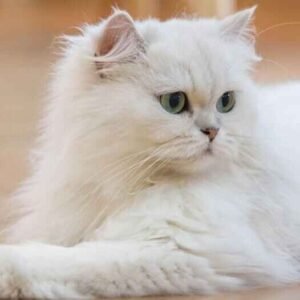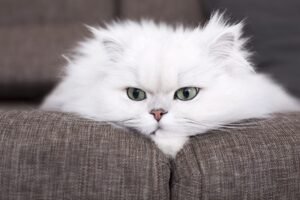The Persian Cat: A Regal and Lovable Companion
The Persian cat is one of the most iconic and beloved cat breeds worldwide. Known for their luxurious long fur, expressive eyes, and calm demeanor, Persian cats have captured the hearts of pet lovers for centuries. In this article, we’ll dive into the fascinating world of Persian cats, covering their history, physical characteristics, temperament, and care needs, helping you understand why they make such wonderful pets.
History of the Persian Cat
The Persian cat’s origins date back to ancient times, and it is believed to have been introduced to Europe in the 1600s. Although the breed’s exact origins are somewhat unclear, it is widely accepted that Persian cats come from Persia (modern-day Iran). Early Persian cats were prized for their beauty, with their long, flowing coats and graceful appearance making them popular among royalty and the wealthy.
Throughout history, Persian cats have been associated with luxury and opulence. They were favored by many European aristocrats and even by some of the world’s most famous historical figures, including Queen Victoria of England, who had a particular fondness for the breed. Persian cats eventually made their way to the United States in the early 1900s, where they were further refined and became one of the most popular breeds in the world.
Physical Characteristics of Persian Cat
Persian cats are immediately recognizable due to their distinctive appearance. Here are some of the most defining physical traits of this majestic breed:
- Long, Silky Coat: Persian cats are renowned for their long, dense fur, which comes in a variety of colors and patterns. From solid hues to bicolor or even exotic patterns like the chinchilla silver, Persian cats have one of the most beautiful coats in the cat world.
- Round Face and Large Eyes: Persian cats have a round, flat face with large, expressive eyes that are often described as “doll-like.” Their wide, open eyes give them an almost human-like expression, which many cat lovers find endearing.
- Stocky Build: Persian cats are generally medium to large-sized cats with a rounded body. They have short legs, a broad chest, and a short, thick tail that further contributes to their “cuddly” appearance.
- Muzzle and Nose: Depending on the specific type of Persian, the breed can have a slightly different facial structure. The most traditional Persians have a prominent muzzle with a straight nose, but the more recent “Peke-face” Persians have a flat, squished nose.

Personality and Temperament
The Persian cat is often described as the epitome of a calm and laid-back companion. They are known for their gentle and affectionate nature, making them great pets for families, singles, and seniors alike.
- Calm and Quiet: Persian cats are generally quiet cats who don’t vocalize much. They are content to lounge around the house, often following their humans from room to room but without demanding attention. If you’re looking for a cat who enjoys a peaceful environment, a Persian is an ideal choice.
- Affectionate Yet Independent: While they enjoy being near their humans and will gladly accept petting or cuddles, Persian cats are not as needy or clingy as some other breeds. They are affectionate but have a somewhat independent nature, which means they can entertain themselves for a while if necessary.
- Good with Children and Other Pets: Persian cats are usually patient and tolerant, which makes them well-suited for families with children or other pets. However, due to their calm disposition, they may not enjoy rough handling or excessive noise, so it’s important to teach children to respect their space.
Caring for a Persian Cat
Owning a Persian cat comes with certain responsibilities, especially when it comes to grooming. Their long, luxurious coat requires regular maintenance to keep it looking beautiful and to prevent matting. Here are some tips for taking care of a Persian cat:
- Daily Grooming: Persian cats require daily brushing to keep their coats tangle-free and reduce shedding. This is essential to prevent their fur from matting, which can cause discomfort for your cat. Regular grooming also helps to manage any excess hair and can minimize hairballs.
- Bathing: While Persians are generally good at grooming themselves, they will occasionally benefit from a bath. A gentle bath every few months helps keep their coat soft and shiny. It’s important to use pet-safe shampoo to avoid irritating their sensitive skin.
- Regular Eye Care: Persian cats are known for having tear ducts that can produce excess moisture, leading to tear staining. You should clean the area around their eyes regularly to prevent stains from forming. This is especially true for white and light-colored Persians.
- Health Monitoring: Like many purebred cats, Persian cats can be prone to certain health conditions, such as respiratory issues due to their flat faces, as well as kidney disease and dental problems. Regular vet checkups are crucial to ensure your Persian stays healthy. Persian Cat Diseases

Health Considerations
Although Persian cats are generally healthy, they do have some specific health concerns to be aware of. Their flat faces (brachycephalic) can lead to breathing difficulties, especially in hot or humid weather. It’s important to keep your Persian cat in a cool, well-ventilated area and avoid excessive physical exertion.
Another common health concern in Persians is kidney disease, particularly in older cats. Regular vet visits, a balanced diet, and keeping your cat hydrated are key to managing these risks. Additionally, dental problems can be an issue for Persians, so brushing their teeth regularly or providing dental treats can help maintain good oral hygiene.
Conclusion
The Persian cat is a regal and loving companion that brings elegance and charm into any home. Their calm demeanor, beautiful appearance, and affectionate nature make them ideal pets for those who appreciate a more relaxed, luxurious pet. However, they do require a good deal of grooming and care, so potential owners should be prepared for the time and effort it takes to maintain their stunning coat and overall health.
If you’re looking for a cat that will provide you with love, companionship, and a little bit of royalty, the Persian cat might just be the perfect fit for you.
Hafiz Haris Khalil